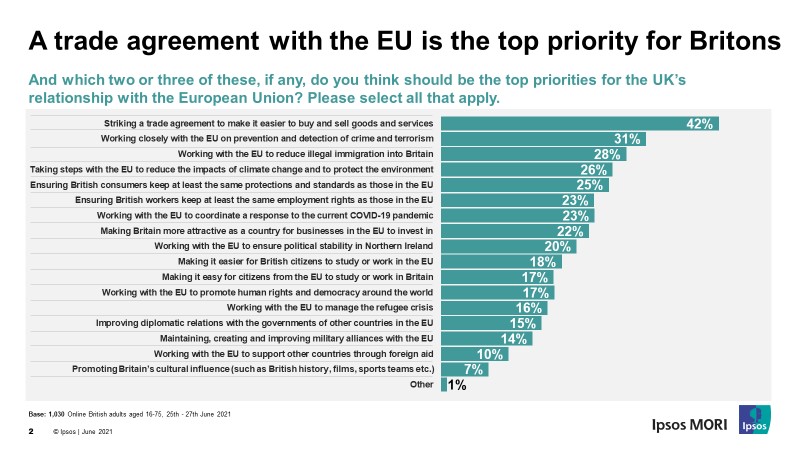Trade is Britons’ top priority for the future relationship with the EU
New polling from Ipsos, in partnership with the EU-UK Forum, reveals that Britons want the UK’s future relationship with the EU to focus on trade, followed by dealing with crime, reducing illegal immigration, taking steps to reduce climate change, and ensuring British consumers keep at least the same standards and protections as in the EU. Trade is important to both Leavers and Remainers, but their other priorities differ. Nevertheless, both Leavers and Remainers believe that it is important for the UK to maintain a good relationship with the EU, and for the EU to maintain a good relationship with the UK.
What should be the top priorities for the UK’s relationship with the EU?
- Four in ten (42%) choose striking a trade agreement to make it easier to buy and sell goods and services.
- Around three in ten choose working closely with the EU on the prevention and detection of crime (31%) and to reduce illegal immigration (28%).
- Around one in four choose taking steps with the EU to reduce the impact of climate change and to protect the environment (26%) and ensuring British consumers keep at least the same protections and standards as those in the EU (25%).
- Less important priorities including promoting Britain’s cultural influence (7%), working with the EU to support other countries through foreign aid (10%) or military alliances with the EU (14%).

- Trade is important to both 2016 Leave voters and 2016 Remain voters (44% among both). However their other priorities differ. Leave voters are more likely to choose reducing illegal immigration (43% vs 20% of Remainers) and dealing with crime (39% vs 30%). Remain voters are more likely to choose working with the EU to combat climate change (34% vs 19% of Leave voters), ensuring British consumers keep at least the same protections and standards as those in the EU (33% vs 19%), and ensuring British workers keep at least the same employment rights as those in the EU (31% vs 18%).
How important is it for the UK and the EU to maintain good relations with each other?
- Britons think it is important for the UK to maintain a good relationship with the EU (88% say this is very or fairly important), and for the EU to maintain a good relationship to maintain a good relationship with the EU (86%).
- Britons are slightly more likely to think it is very important for the UK to maintain good relations with the EU than the other way round (53% vs 46%).
- Both Leavers (84% and 88% respectively) and Remainers (96% and 91%) think it is important for the UK to maintain good relations with the EU, and the EU to maintain good relations with the UK. In both cases, Remainers are much more likely to think it is very important to keep relations positive (76% vs 35% of Leavers for the UK, and 39% vs 39% for the EU).
Kelly Beaver, Managing Director of Public Affairs at Ipsos, said:
The UK’s exit from the EU may have happened over a year ago, but the final look of our relationship with the EU isn’t yet determined. Our latest findings show too that while there is consensus among those who voted Leave and Remain in 2016 in prioritising trade, the other priorities aren’t as clear cut across the two groups, showing that there’s a difficult path to walk for the Government moving forward in our relationship with the European Union if they try to please all of the people all of the time.
Paul Adamson, Chairman of the EU|Forum and Founder of Encompass said:
Irrespective of how people voted in the referendum there is widespread agreement that there are many issues still to be addressed in the EU-UK relationship and that Brexit is far from done. To that end, there is a very wide consensus that the UK and the EU should maintain good relations with each other in the future.
Technical notes
- Ipsos interviewed a representative sample of 1,030 online British adults aged 16-75. Interviews were conducted online from 25-27 June 2021. Data are weighted to match the profile of the population. All polls are subject to a wide range of potential sources of error.




